Femtech: Making women's health sexy
Women's health is still usually misunderstood as just reproductive health. While femtech startups are trying to change that, the industry is underfunded and witnessing a slow growth


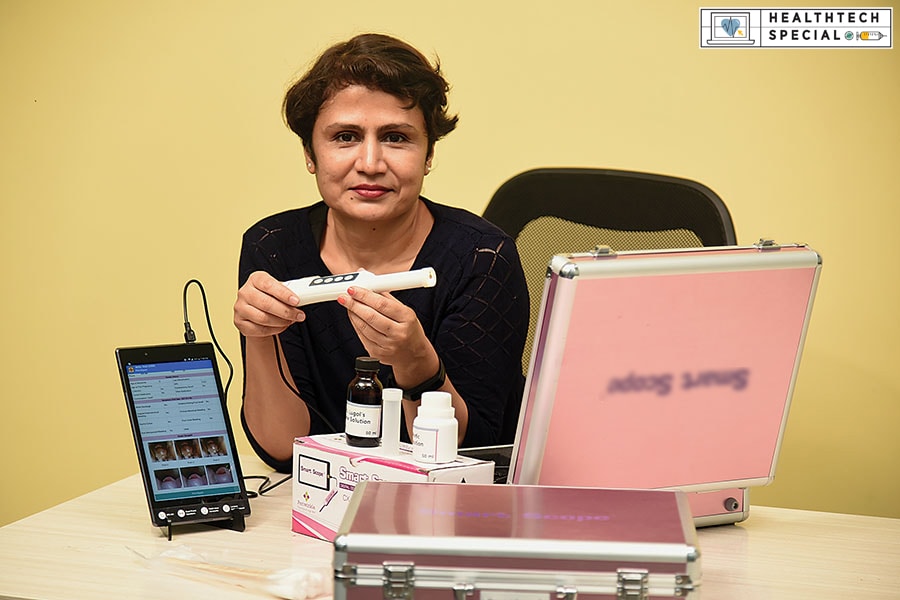 Veena Moktali, co-founder, Periwinkle Technologies
Veena Moktali, co-founder, Periwinkle Technologies
Image: Anirudha Karmakar for Forbes India
In 2019, 500 women were tested in a Pune-based OPD for cervical cancer and 20 of them showed pre-cancerous lesions. A previous Pap smear test had missed these in 14 women.
They were tested with Smart Scope, a hand-held cervical health screening system that uses artificial intelligence (AI) to classify abnormalities in a body cavity to enable a trained health worker to provide results in a single visit. The Smart Scope, says Veena Moktali, can provide results in under seven minutes.
Moktali and co-founder Koustubh Naik’s Periwinkle Technologies launched the Smart Scope in 2019. It is an innovation in the femtech sector, an industry that is still at a nascent stage due to underfunding despite its massive potential, given that women in India lack awareness around sexual health and access to medical intervention.
A term that encompasses products and technology that cater to women’s health needs, femtech has so far been limited to period tracking, fertility, pregnancy, maternal and child care, and family planning to empower women to better track and understand their data.
“However, women are much more than their reproductive capabilities, and women’s health goes beyond the needs of fertility and reproduction," says Suchismita Das, industry analyst-health care and life sciences practice-at research and consulting firm Frost & Sullivan.
“India still has a lot of room for development to create awareness, affordability, and accessibility to cater to specific women’s health issues. Femtech in India needs to spread its wings from just period care to advanced technologies that can make life better for women," she adds.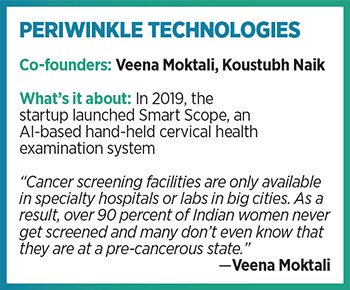
Moktali agrees. In India, 17 percent of all cancer deaths among women aged between 30 and 69 are due to cervical cancer. The National Center for Biotechnology Information estimates that cervical cancer will occur in approximately 1 in 53 Indian women during their lifetime compared to 1 in 100 in developed countries.
Despite the alarmingly high figures, India does not have a nationwide government-sponsored screening programme, even though breast cancer and cervical cancer can be cured if diagnosed at an early stage.
“The current cervical cancer screening methods are subjective and time-consuming. Moreover, these facilities are only available in specialty hospitals and labs in big cities. As a result, over 90 percent of Indian women never get screened and many don’t even know that they are at a pre-cancerous state," says Moktali.
Smart Scope can be made available even in small private clinics, nursing homes, municipal dispensaries, primary health care centres and district hospitals. It has benefited over one lakh women spanning six states in India and has made remote expert reviews available across three continents. Not only its portability, but also its low operational cost is helping many more women get diagnosed in the early stages. Moktali says under the Ayushman Bharat scheme, a Smart Scope test and a colposcopy-guided biopsy can cost under ₹1,000, whereas in private setups, the clinician can provide the Smart Scope test at a cost similar to a Pap smear test, but without the dependency on an external lab and associated delays.
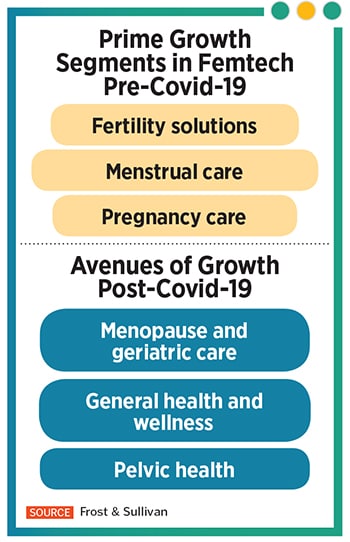 But its major advantage, she says, is that it gives quick results, compared to the week-long turnaround of a lab-based test. This has helped in many ways. She recounts an incident of a tribal woman who didn’t visit a clinic that was four hours away for further investigations despite being advised by a visiting doctor in her village that her symptoms signal cancer.
But its major advantage, she says, is that it gives quick results, compared to the week-long turnaround of a lab-based test. This has helped in many ways. She recounts an incident of a tribal woman who didn’t visit a clinic that was four hours away for further investigations despite being advised by a visiting doctor in her village that her symptoms signal cancer.
“For women in villages, daily wages are far more important than their own health. They will not spend days travelling for tests and results. For this woman, when the Smart Scope showed her in the red band immediately after she got tested, she understood the complexity of the situation and turned up at the clinic the next day," Moktali says. For another bank manager, the device helped her detect the pre-cancer in grade-II stage and she was able to access a minimally-invasive treatment on the same day instead of having to take more work days off.
The aim is to now expand operations in other states, increase private health care sales and enter markets outside India.
While Smart Scope could possibly be an answer to the long-standing problem, it is still a drop in the ocean considering the gamut of women’s needs that remain unaddressed. The industry’s focus has only now started to shift towards pre-menopause and menopause issues, along with other areas such as endometriosis, pelvic health, fibroids, thyroid problems, mental health issues, and PCOS.
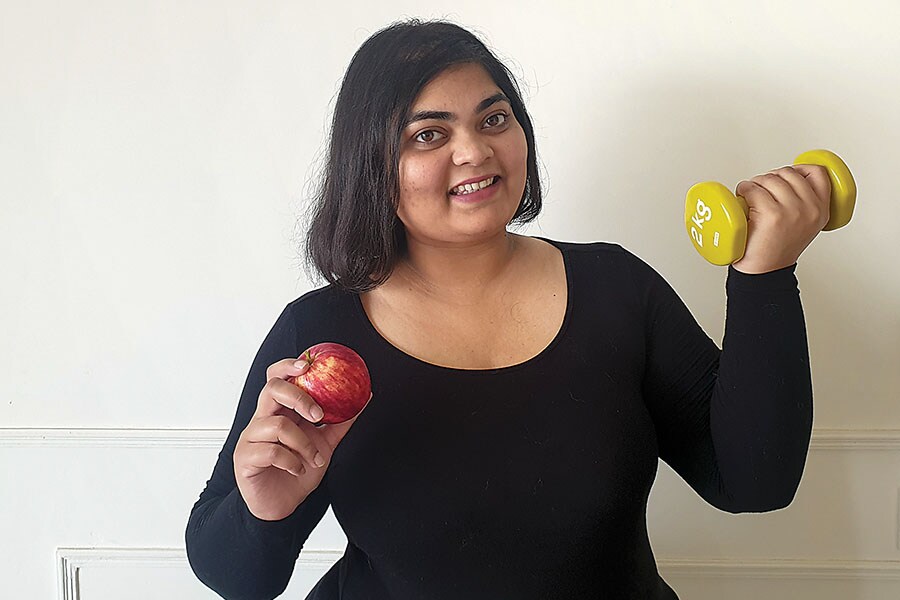 Evelyn Immanuel, founder, MyAva
Evelyn Immanuel, founder, MyAva
MyAva is one such platform that was founded to help women deal with chronic health issues. Launched in July 2020, the Bengaluru-headquartered lifestyle management website and app helps women deal with polycystic ovary syndrome (PCOS), thyroid, and insulin resistance.
According to medical reports, one in every five women in India suffers from PCOS, a hormonal disorder characterised by irregular menstruation, obesity, excess hair growth and acne. MyAva’s founder, 31-year-old Evelyn Immanuel, is one of them.
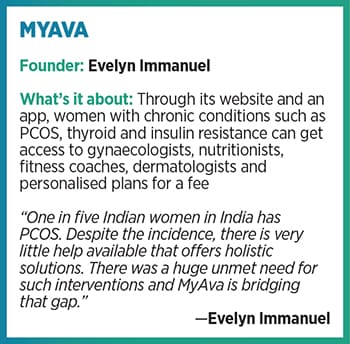 “The idea was born out of the frustration of being prescribed birth control pills after pills, and moving from doctor to doctor. The fact that there was no holistic solution to this made me want to look at offering an integrated management for chronic conditions in women," says Immanuel.
“The idea was born out of the frustration of being prescribed birth control pills after pills, and moving from doctor to doctor. The fact that there was no holistic solution to this made me want to look at offering an integrated management for chronic conditions in women," says Immanuel.
On the platform, a team of various experts, including gynaecologists, nutritionists, fitness coaches, dermatologists and mental health professionals are currently helping 15,000 women navigate various chronic conditions that require a holistic approach and often demand lifestyle changes. Through its community page, women can discuss their PCOS journey, avail of a PCOS guide curated from clinical research papers that are free of cost. Through its subscription plans priced between ₹2,500 and ₹14,000, the platform offers counselling, a personalised PCOS diet and workout plans, infertility support and hair and skin treatment plans.
For Dr Apoorva Pallam Reddy, a fertility specialist and laparoscopic surgeon who has been associated with MyAva for over a year, platforms like these are important because they make medical care a little more accessible to all.
“There has always been a gap between gynaecologists and Indian women especially because they fear being judged or get unsolicited advice. Technological platforms are now helping bridge this gap and help patients get access to friendly, non-judgmental care," says Dr Reddy. “If women don’t reach out, it prevents them from taking the right course of treatment and in conditions such as PCOS, it might lead to long-term fertility issues. And Covid-19 has highlighted the need for more such platforms," she adds.
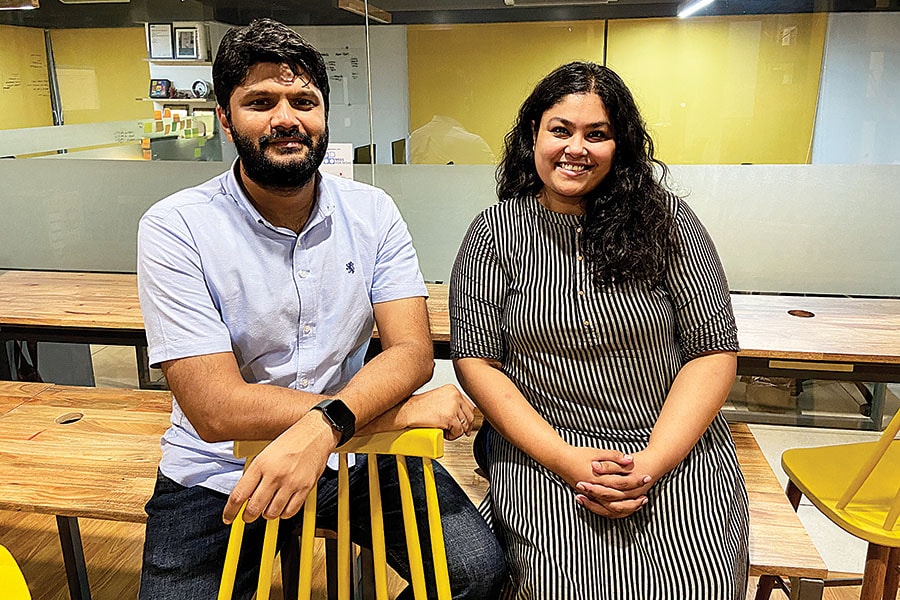 Krutika Katrat and Sneh Bhavsar, Co-founders, OoWomaniya
Krutika Katrat and Sneh Bhavsar, Co-founders, OoWomaniya
Realising the need for having a safe and non-judgmental space for women, Krutika Katrat and Sneh Bhavsar launched OoWomaniya in 2014.
What started as an anonymous experience-sharing platform is now a one-stop solution for women to access information, experts and services related to their health, says the duo. On a website, it brings together a panel of credible and reputed experts to help in verifying content and answer user queries.
“We also felt the need to pivot to offline services to tackle the acute lack of information and basic knowledge about reproductive health issues among women. We expanded to colleges, schools, corporates and even in rural areas to educate girls and women on menstrual hygiene, pregnancy and other health-related issues," says Bhavsar.
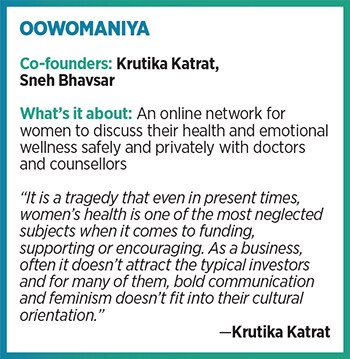 While these offline programmes are run in five states, women can also access information through their web portal and content partner sites. An expert consultation is available through web and mobile applications for ₹99. This has helped more than 1.5 million women.
While these offline programmes are run in five states, women can also access information through their web portal and content partner sites. An expert consultation is available through web and mobile applications for ₹99. This has helped more than 1.5 million women.
“OoWomaniya as a digital platform will grow at a steady pace, more so because of the pandemic. It has changed the way people access information and services. We look forward to growing the digital apps to reach out to more and more people in the coming five years," says Bhavsar.
In addition to these health-centric femtech startups is another startup to tackle women’s hygiene. Woloo is a tech-enabled loo-discovery platform, funded by JetSynthesys, which helps women locate the nearest washroom whenever they are away from home or office, says its co-founder Manish Kelshikar.
Through the Woloo app, women can easily find Woloo hosts (premium restaurants, and QSRs that have tied up with the company) and Woloo powder rooms near suburban train and bus stations, temples, and tourist places through a subscription plan for ₹99 a month.
“When you think of a toilet facility, there is an assumption of the stink, unhygienic and unsafe environment that comes to your mind. That is precisely what we wanted to change," says Kelshikar.
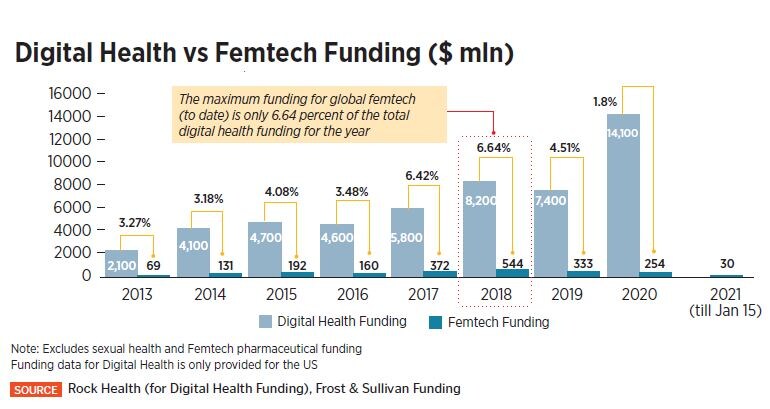
These powder rooms with toilets are air-conditioned facilities with a café and a women-centric convenience store selling sanitary products and more. They also have diaper changing stations and feeding zones.
While the plans were to open 10 powder rooms a year, there are now 1,500 in Mumbai, including Woloo hosts that have tied up with the organisation to make their toilets hygienic and safe. On the drawing board are more than 25,000 geo-tagged washrooms in over 160 cities.
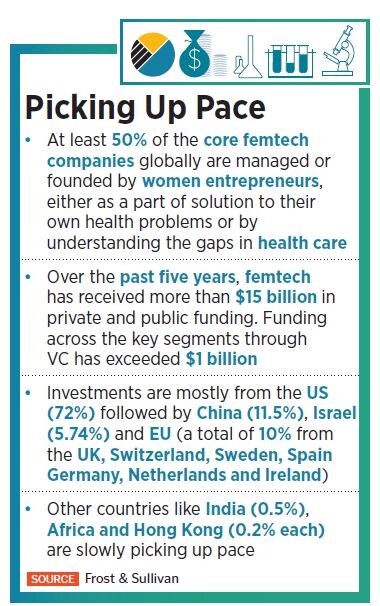 “More than eight million people, 41 percent of whom are women, use Mumbai’s local trains and they don’t have access to clean toilets. Women we’ve spoken to say they don’t drink water for hours before they have to travel for the fear of having to use a public toilet. Woloo is not just a toilet but a place for women to catch breath, relax, or wait for someone if they need a safe space to do so... our mission is to provide hygiene dignity to 150 million urban working women," says Kelshikar.
“More than eight million people, 41 percent of whom are women, use Mumbai’s local trains and they don’t have access to clean toilets. Women we’ve spoken to say they don’t drink water for hours before they have to travel for the fear of having to use a public toilet. Woloo is not just a toilet but a place for women to catch breath, relax, or wait for someone if they need a safe space to do so... our mission is to provide hygiene dignity to 150 million urban working women," says Kelshikar.
Men vs women
Although femtech startups are slowly starting to emerge and are revolutionising women’s health, the industry remains a stepchild of digital health, feels Das.
According to a Frost & Sullivan report, the femtech market revenue will cross $1 billion by 2024, growing at a compound annual growth rate (CAGR) of 12.9 percent (2019-2024). Despite a cumulative of $2 billion that has been invested in the women’s health space, it represents less than three percent of the total digital health investments between 2013 and 2020.
In addition, while the pandemic led to a huge jump in funding for digital health solutions, femtech solutions have not experienced the same growth, Das says. “A major chunk of this amount, approximately 65 percent, directly goes to companies addressing fertility, pregnancy, and motherhood—areas that have somehow managed to collectively represent femtech as an industry," says Das.
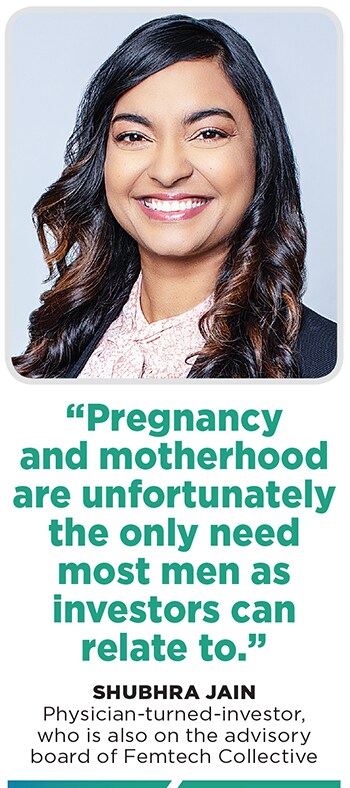 This is because VC (venture capital) funding is still witnessing gender bias wherein male investors are unable to understand and relate to women’s needs and solutions. “If a comparison is drawn between menopause and erectile dysfunction, the latter led companies to heights, whereas the former remained underfunded and insignificant," Das adds.
This is because VC (venture capital) funding is still witnessing gender bias wherein male investors are unable to understand and relate to women’s needs and solutions. “If a comparison is drawn between menopause and erectile dysfunction, the latter led companies to heights, whereas the former remained underfunded and insignificant," Das adds.
Another problem with the paucity of women in boardrooms and senior leadership is that it is often difficult for major corporations to fathom business opportunities that femtech products capture. “They are often dismissed as ‘niche’ opportunities with a ‘small market’, says Dr Shubhra Jain, a physician-turned-investor, who is also on the advisory board of Femtech Collective, a global network of health tech professionals. “Pregnancy and motherhood are unfortunately the only need most men as investors can relate to. There is a whole sector of the female population beyond the age of 40-45 who struggle with challenges like menopause, vaginal dryness, incontinence and more which have still not gained much attention. There is also a whole industry around sex-tech and pleasure-tech to empower and enable women to take control of their pleasure and life whose potential remains untapped," she adds.
Katrat of OoWomaniya, who raised seed funding through a private investor and won grants from the government’s startup funds, says, “Investors have often looked at us as a non-profit that works for women. It is a tragedy that even in present times, women’s health is one of the most neglected subjects when it comes to funding, supporting or encouraging. As a business, often it doesn’t attract the typical investors and, for many of them, bold communication and feminism doesn’t fit into their cultural orientation." She adds, “We have had our share of disappointments from investors, industry leaders, but our users have always valued our work, so we have sustained our business without being financially dependent on investors."
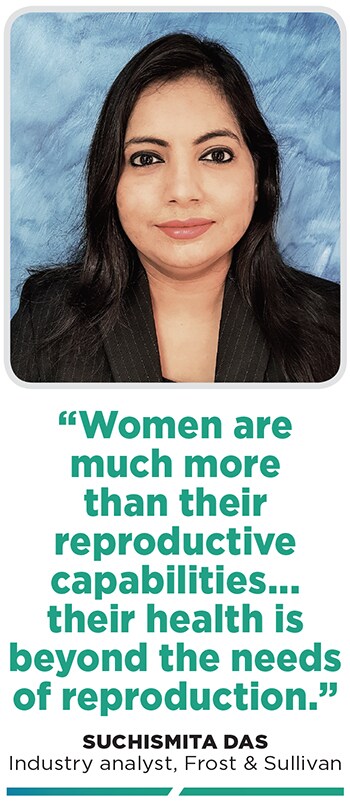 Katrat’s experience is something investors are aware of.
Katrat’s experience is something investors are aware of.
In its research phase before launching the Athena scaling programme to mentor women entrepreneurs and offering funding to selected startups, Anthill Ventures spoke extensively with them. And some common themes emerged, says partner and leader of the programme, Kabir Kochhar. “Financial planning and fundraising are concerns, especially with female founders that, at times, don’t have a male co-founder. There is also a large concern with government relations and vendor management where women at times are not taken as seriously as male counterparts. There is a need to connect first-time female founders with their entrepreneurial peers and strengthen their own networks," he says.
Given equal opportunities, women businesses perform on a par with men-led enterprises, says Arati Menon-Gupta, a partner with the programme. “Women are underrepresented in the investor community, and by this, I mean both as VCs and investors and also as venture-backed entrepreneurs. Stereotypically, if you are a VC, you are almost certainly a man," she says.
“It has also been observed that women-led companies, with some degree of risk aversion, are less inclined to pursue external financing options. Many of them prefer to provide a large chunk of startup capital by themselves. A combination of all the above factors and gender bias on the part of men leads to this vicious cycle that has been difficult to break," she adds.
First Published: Jul 28, 2021, 10:16
Subscribe Now